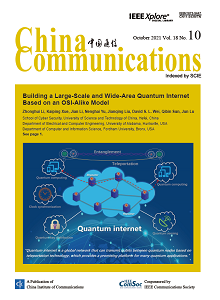mMTC/URLLC设备共存的智能前置分配:一种基于分层q学习的方法
IF 3.1
3区 计算机科学
Q2 TELECOMMUNICATIONS
引用次数: 0
摘要
各种商用和工业物联网设备的出现,给人们的生活和生产带来了极大的便利。低功耗、大连接的mMTC设备和高可靠、低时延的URLLC设备在不同的应用场景中发挥着重要作用。但是,当密集的MDs和UDs定期发起RA (random access)连接基站并发送数据时,由于前段资源有限,容易发生前段冲突,导致设备访问失败和数据传输延迟。同时,由于UDs对可靠性的要求很高,需要平滑的接入和快速的数据传输,因此需要降低RA过程的故障率。为此,我们提出了一种智能序文分配方案,该方案利用分层强化学习在基站侧划分UD独占序文资源池,并在设备侧的每个RA槽内进行序文选择。特别是考虑到物联网设备有限的处理能力和能量,我们在设备端采用轻量级q -学习算法,并为其设计简单的状态和动作。实验结果表明,提出的智能方案能够显著降低UDs的传输失败率,提高设备的整体接入成功率。本文章由计算机程序翻译,如有差异,请以英文原文为准。
Intelligent preamble allocation for coexistence of mMTC/URLLC devices: A hierarchical Q-learning based approach
The emergence of various commercial and industrial Internet of Things (IoT) devices has brought great convenience to people's life and production. Both low-power, massively connected mMTC devices (MDs) and highly reliable, low-latency URLLC devices (UDs) play an important role in different application scenarios. However, when dense MDs and UDs periodically initiate random access (RA) to connect the base station and send data, due to the limited preamble resources, preamble collisions are likely to occur, resulting in device access failure and data transmission delay. At the same time, due to the high-reliability demands of UDs, which require smooth access and fast data transmission, it is necessary to reduce the failure rate of their RA process. To this end, we propose an intelligent preamble allocation scheme, which uses hierarchical reinforcement learning to partition the UD exclusive preamble resource pool at the base station side and perform preamble selection within each RA slot at the device side. In particular, considering the limited processing capacity and energy of IoT devices, we adopt the lightweight Q-learning algorithm on the device side and design simple states and actions for them. Experimental results show that the proposed intelligent scheme can significantly reduce the transmission failure rate of UDs and improve the overall access success rate of devices.
求助全文
通过发布文献求助,成功后即可免费获取论文全文。
去求助
来源期刊

China Communications
工程技术-电信学
CiteScore
8.00
自引率
12.20%
发文量
2868
审稿时长
8.6 months
期刊介绍:
China Communications (ISSN 1673-5447) is an English-language monthly journal cosponsored by the China Institute of Communications (CIC) and IEEE Communications Society (IEEE ComSoc). It is aimed at readers in industry, universities, research and development organizations, and government agencies in the field of Information and Communications Technologies (ICTs) worldwide.
The journal's main objective is to promote academic exchange in the ICTs sector and publish high-quality papers to contribute to the global ICTs industry. It provides instant access to the latest articles and papers, presenting leading-edge research achievements, tutorial overviews, and descriptions of significant practical applications of technology.
China Communications has been indexed in SCIE (Science Citation Index-Expanded) since January 2007. Additionally, all articles have been available in the IEEE Xplore digital library since January 2013.
 求助内容:
求助内容: 应助结果提醒方式:
应助结果提醒方式:


